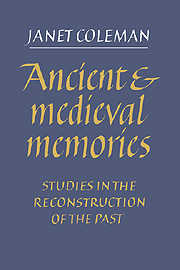Book contents
- Frontmatter
- Contents
- Preface
- List of abbreviations
- PART I THE CRITICAL TEXTS OF ANTIQUITY
- Introduction
- PART II THE PRACTICE OF MEMORY DURING THE PERIOD OF TRANSITION FROM CLASSICAL ANTIQUITY TO THE CHRISTIAN MONASTIC CENTURIES
- Introduction
- 8 The early monastic practice of memory: Gregory the Great; Benedict and his Rule
- 9 Bede, monastic grammatica and reminiscence
- 10 Monastic memory in service of oblivion
- 11 Cistercian ‘blanched’ memory and St Bernard: the associative, textual memory and the purified past
- 12 Twelfth-century Cistercians: the Boethian legacy and the physiological issues in Greco-Arabic medical writings
- PART III THE BEGINNINGS OF THE SCHOLASTIC UNDERSTANDING OF MEMORY
- Introduction
- PART IV ARISTOTLE NEO-PLATONISED: THE REVIVAL OF ARISTOTLE AND THE DEVELOPMENT OF SCHOLASTIC THEORIES OF MEMORY
- Introduction
- PART V LATER MEDIEVAL THEORIES OF MEMORY: THE VIA ANTIQUA AND THE VIA MODERNA.
- Introduction
- Conclusion: an all too brief account of modern theories of mind and remembering
- Bibliography
- Index
9 - Bede, monastic grammatica and reminiscence
Published online by Cambridge University Press: 06 January 2010
- Frontmatter
- Contents
- Preface
- List of abbreviations
- PART I THE CRITICAL TEXTS OF ANTIQUITY
- Introduction
- PART II THE PRACTICE OF MEMORY DURING THE PERIOD OF TRANSITION FROM CLASSICAL ANTIQUITY TO THE CHRISTIAN MONASTIC CENTURIES
- Introduction
- 8 The early monastic practice of memory: Gregory the Great; Benedict and his Rule
- 9 Bede, monastic grammatica and reminiscence
- 10 Monastic memory in service of oblivion
- 11 Cistercian ‘blanched’ memory and St Bernard: the associative, textual memory and the purified past
- 12 Twelfth-century Cistercians: the Boethian legacy and the physiological issues in Greco-Arabic medical writings
- PART III THE BEGINNINGS OF THE SCHOLASTIC UNDERSTANDING OF MEMORY
- Introduction
- PART IV ARISTOTLE NEO-PLATONISED: THE REVIVAL OF ARISTOTLE AND THE DEVELOPMENT OF SCHOLASTIC THEORIES OF MEMORY
- Introduction
- PART V LATER MEDIEVAL THEORIES OF MEMORY: THE VIA ANTIQUA AND THE VIA MODERNA.
- Introduction
- Conclusion: an all too brief account of modern theories of mind and remembering
- Bibliography
- Index
Summary
…the human accomplishment of lengthy verbatim recall arises as an adaptation to written text and does not arise in cultural settings where text is unknown. The assumption that nonliterate cultures encourage lengthy verbatim recall is the mistaken projection by literates of text-dependent frames of reference. Lengthy verbatim recall (LVR) is a large-scale unit of language performance, namely, the recall with complete word-for-word fidelity of a sequence of 50 words or longer. The criterion is strict. The words and their sequence must be verbatim correct. A close paraphrase does not meet the criterion, nor does recall which is ‘almost’ word for word… My interest in the relations between LVR and text arose from curiosity about a belief that nonliterate cultures encourage feats of work-for-word remembering. The belief runs like this. In the days when no-one could read or write, there were people with such extraordinary memory that they could give word-for-word recitals of sagas, stories, ballads, family histories. The words were written, not in books but in living memory and were passed by word of mouth from person to person and from generation to generation… I met the belief when I was a schoolboy and I accepted it unthinkingly. Years later, I read Bartlett (1932) and became involved in experiments where people listen to stories and try to recall them. In such experiments there is not much word-for-word recall … Do nonliterate cultures really contain people with exceptional word-for-word memory? […]
- Type
- Chapter
- Information
- Ancient and Medieval MemoriesStudies in the Reconstruction of the Past, pp. 137 - 154Publisher: Cambridge University PressPrint publication year: 1992

